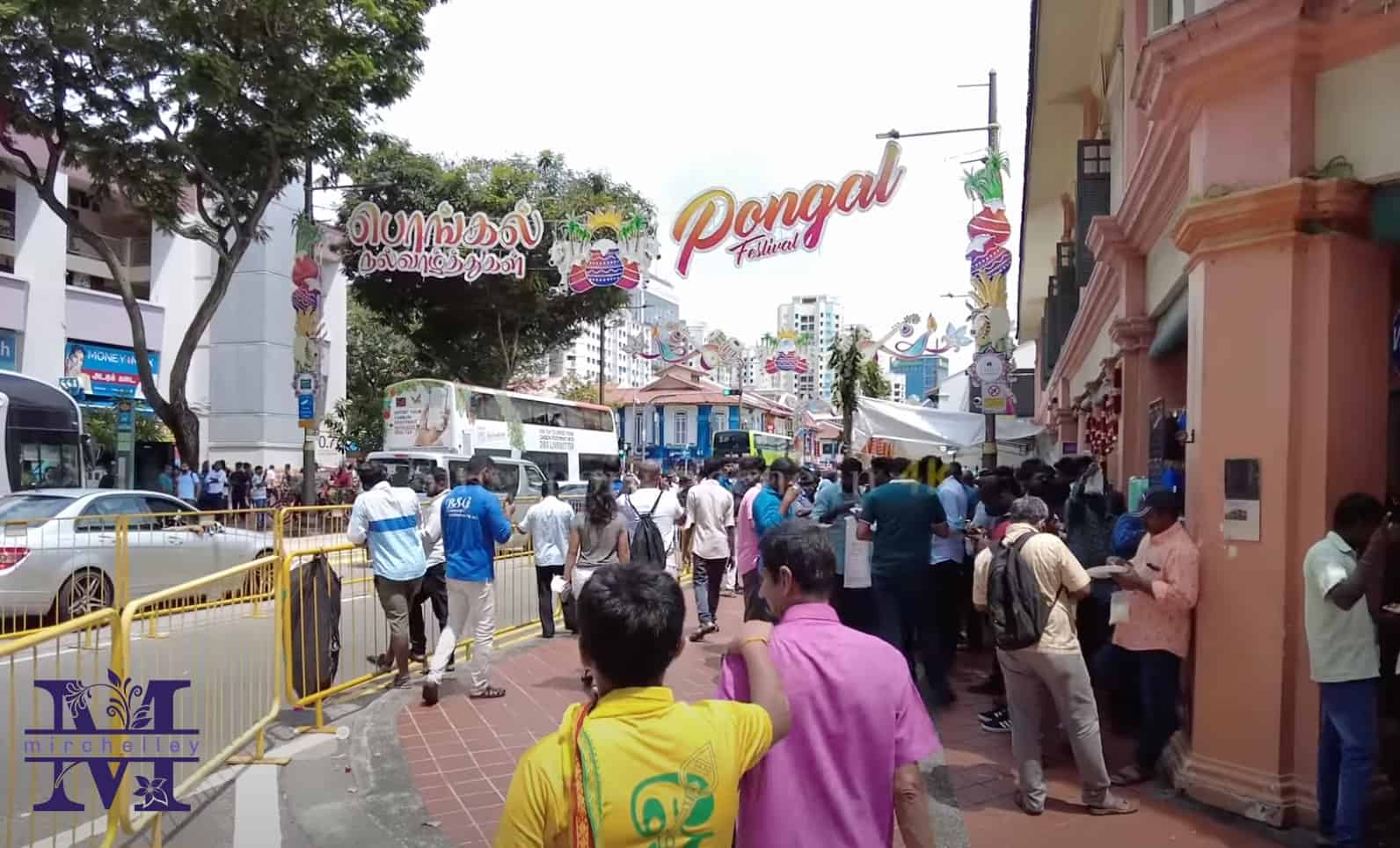Categories > Guides and Tips

What You Need to Know About Thaipusam in Singapore
- What is Thaipusam?
- When is Thaipusam celebrated?
- Is Thaipusam a public holiday in Singapore?
- How is Thaipusam celebrated?
- Thaipusam Ritual Preparations
- Thaipusam in Singapore: Serangoon Road to Tank Road
- Tips for Thaipusam Spectators and Devotees
- Don’t make loud noises unless it is part of the procession.
- Do not mock the hymns.
- Bring an offering.
- Bring sun protection.
- Wear light and comfortable clothing.
As a country that embraces different cultures and religions, Singapore celebrates a dozen of religious festivals including the Thaipusam. This festival is a colorful and lively annual Hindu celebration in honor of Lord Subramaniam or Lord Murugan.
I may not be part of the Hindu religion, but I always looked at this festival and the devotees in wonder whenever I witness the procession. With this blog, I will guide you through the events of Thaipusam.
What is Thaipusam?

Thaimpusam is a significant Hindu festival celebrated by the Tamil communities in Singapore. It is held in honor of Lord Murugan, also known as the destroyer of evil and the representation of youth, virtue, and power.
The ceremony starts at midnight. During the procession, the first batch of devotees will carry milk pots, wooden Kavadis, or spiked Kavadis.
Alongside this, a chariot procession will also join the devotees in their march from Sri Thendayuthapani at Tank Road to Layan Sithi Vinayagar Temple at Keong Saik Road. The chariot will carry the statue of Lord Murugan.
Devotees of Lord Murugan practice self-mortification and the Kavadi is used as a ceremonial device to pierce the body in Hinduism. These Kavadis are often decorated with colorful tassels and feathers to represent an offering.
If you are wondering why the festival is called Thaipusam, it is named after a star known as Pusam. This star is at its highest peak during the festival.
When is Thaipusam celebrated?

Thaipusam is generally held in late January or early February. The exact date can change each year.
The whole festival and procession usually last up to two (2) days and always falls on a weekend to give every devotee time to honor their beliefs without leaving work. The ceremony starts at midnight and ends late at 11:00 PM.
Is Thaipusam a public holiday in Singapore?

Thaipusam is not a public holiday in Singapore. After a 1968 decree passed by the government, Hinduism devotees in the country gave up Thaipusam as a holiday.
This decree was created after Britain decided to withdraw its troops from Singapore in 1967. The move created a backlash on the nation’s security and defense, which then resulted in the government reducing the holidays to keep the country’s economy afloat.
The decree didn’t just affect Hindu religious holidays. Muslims and Christians also had to reduce their holidays in an effort to compete in the global market.
How is Thaipusam celebrated?

Thaipusam is celebrated by parading the statue of Lord Murugan in a chariot while devotees pierce their flesh carrying wooden Kavadis and jugs of milk. The procession begins at midnight and often starts from one Hindu temple to another.
Kavadi means “sacrifice at every step” which is exactly what devotees put themselves through by carrying religious self-mortification devices.
A lot of people cringe in pain when they see the state of the devotees carrying the Kavadis, but this device is symbolic for the Hinduism believers. It honors the burdens of the devotee Iduban when he carried the offerings to Lord Murugan.
The tassels, feathers, and decorations used for the Kavadis are often dyed orange, yellow, and red since it is believed to be Lord Murugan’s favorite colors. Each tassel represents the devotee’s offering.
Thaipusam Ritual Preparations

Devotees carrying Kavadis is one of the highlights of the Thaipusam festival. This ritual is done to offer thanks, create a vow, or ask for forgiveness from Lord Subramaniam.
The shape of the Kavadi is said to replicate a mountain where Lord Subramaniam is at its peak. The smaller, semi-circular part of the Kavadi is made of steel or a D-shaped wooden frame that helps support the bars on the shoulder.
Another form of ritualistic sacrifice includes piercing silver pins through the cheek and tongue while also pricking the whole body with huge needles and hooks.
The concept of carrying a Kavadi and piercing the body is closely related to the ritual of purity and pollution. In this state, you are sustained merely by faith while in a trance-like state.
The devotees who are interested in participating in this ritual are required by their custom to observe strict mental and physical discipline. Purification of the body is necessary during the tenth Lunar month.
Part of the preparation includes eating only one vegetarian meal a day and abstaining from any form of sexual acts. Additionally, the devotees should observe 24-hour fasting on the eve of Thaipusam.
The act of carrying the Kavadi is only performed by male believers. The female devotees are tasked to carry pots of milk also known as Palkuddam and pour it over the statue of Lord Subramaniam once the procession ends.
The strict preparation was said to free the mind and body from material worth and physical pleasure. Once the devotee reaches this state, they can carry out their task without feeling pain.
Thaipusam in Singapore: Serangoon Road to Tank Road

The Thapusam procession usually starts at the Sri Srinivasa Perumal Temple in Serangoon. From there, the devotees take a 4km walk toward the Sri Tendayuthapani Temple where the statue of Lord Murugan will be placed and drenched in milk.
The procession is usually led by the milk bearers followed by the men carrying the Kavadi. The rest of the other devotees can march along with their offerings towards the temple.
Although the city doesn’t close off the road for the procession, there are barriers that devotees can walk in on. Safety officers can also be found to assist in traffic situations whenever the procession crosses a road.
Tips for Thaipusam Spectators and Devotees

Thaipusam is a religious festival and should be honored and respected as such, regardless if you are part of the religion or not. To make sure that you have a peaceful celebration, keep the following tips in mind.
1. Don’t make loud noises unless it is part of the procession.
As spectators or even as part of the parade, it would be disrespectful for the believers if people interrupt their ritual with loud noises. These processions often pass by the main road and oftentimes, drivers are insensitive enough to honk at the passing crowd.
I encourage everyone who attends the festival to respect the depth of the occasion and refrain from making unnecessary noise during the procession.
2. Do not mock the hymns.
Believe it or not, countless people still don’t recognize how wrong it is to copy the Hindu mantras and hymns. Even if your intention is not to mock, saying their mantras without understanding their depth and meaning can seem disrespectful to the devotees.
3. Bring an offering.
If you intend to participate in the festival, I highly advise bringing either of the following offerings:
- Brown sugar
- Theertam (holy water)
- Panchagavyam (milk, curd, or yogurt)
- Lime juice
- Panneer (rose water)
- Sweet fruits
- Ginger oil
- Tender coconut water
- Saffron
- Vibhuti
- Abhisheka Koottu
4. Bring sun protection.
The festival will be held out in the open. If you are sensitive to light, I advise you to bring your sunglasses, sunscreen, or umbrella during the procession.
5. Wear light and comfortable clothing.
The place will be packed and you will sweat a lot if you participate in the parade. Make sure that you wear light and comfortable clothes that will make it easier for you to walk the 4km route to the temple.
Thaipusam is one of the most celebrated religious festivals in Singapore. It showcases the devotion, purity, and oneness of the Hindu believers in a colorful and symbolic parade.




